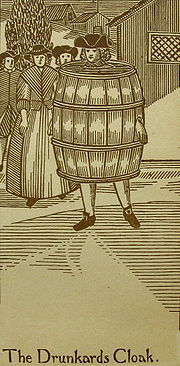
Curious Punishments of Bygone Days
Encyclopedia

Alice Morse Earle
Alice Morse Earle was an American historian and author from Worcester, Massachusetts. She was christened Mary Alice by her parents Edwin Morse and Abby Mason Clary. On 15 April 1874, she married Henry Earle of New York, changing her name from Mary Alice Morse to Alice Morse Earle...
and printed by Herbert S. Stone & Company. Earle was a historian of Colonial America
Colonial America
The colonial history of the United States covers the history from the start of European settlement and especially the history of the thirteen colonies of Britain until they declared independence in 1776. In the late 16th century, England, France, Spain and the Netherlands launched major...
, and she writes in her introduction:
- "In ransacking old court records, newspapers, diaries and letters for the historic foundation of the books which I have written on colonial history, I have found and noted much of interest that has not been used or referred to in any of those books. An accumulation of notes on old-time laws, punishments and penalties has evoked this volume."
As the title suggests, the subject of the chapters is various archaic punishment
Punishment
Punishment is the authoritative imposition of something negative or unpleasant on a person or animal in response to behavior deemed wrong by an individual or group....
s.
Table of contents
- Foreword
- The BilboeBilboeBilboes were iron restraints placed on a person's ankles or wrists. They were used to restrain prisoners and slaves, and for public corporal punishment for men and women alike....
s - The Ducking StoolCucking stoolDucking-stools and cucking-stools are chairs formerly used for punishment of women in England and Scotland . The term cucking-stool derives from wyuen pine as referred in Langland's Piers Plowman.They were both instruments of social humiliation and censure, primarily for the offense of scolding...
- The StocksStocksStocks are devices used in the medieval and colonial American times as a form of physical punishment involving public humiliation. The stocks partially immobilized its victims and they were often exposed in a public place such as the site of a market to the scorn of those who passed by...
-(Morse seems to make a distinction between stocks for the feet, in the Stocks chapter, and stocks for the head, described in the Pillory article- which itself clashes with the modern day understanding of a pillory as a whipping post) - The Pillory
- Punishments of Authors and Books
- The Whipping Post
- The Scarlet LetterBadge of shameA badge of shame, also a symbol of shame, mark of shame, or simply a stigma, is typically a distinctive symbol required to be worn by a specific group or an individual for the purpose of public humiliation, ostracism, or persecution...
- BrankScold's bridleA scold's bridle, sometimes called "the branks", was a punishment device for men and women, also used as a mild form of torture. It was an iron muzzle in an iron framework that enclose the head. The bridle-bit was about 2 inches long and 1 inch broad, projected into the mouth and pressed down on...
s and GagGagA gag is usually a device designed to prevent speech, often as a restraint device to stop the subject from calling for help. This is usually done by blocking the mouth, partially or completely, or attempting to prevent the tongue, lips, or jaw from moving in the normal patterns of speech. They are...
s - Public Penance
- Military Punishments
- BrandingHuman brandingHuman branding or stigmatizing is the process in which a mark, usually a symbol or ornamental pattern, is burned into the skin of a living person, with the intention that the resulting scar makes it permanent. This is performed using a hot or very cold branding iron...
and Maiming
External links
- Text of Curious Punishments of Bygone Days; public domainPublic domainWorks are in the public domain if the intellectual property rights have expired, if the intellectual property rights are forfeited, or if they are not covered by intellectual property rights at all...

